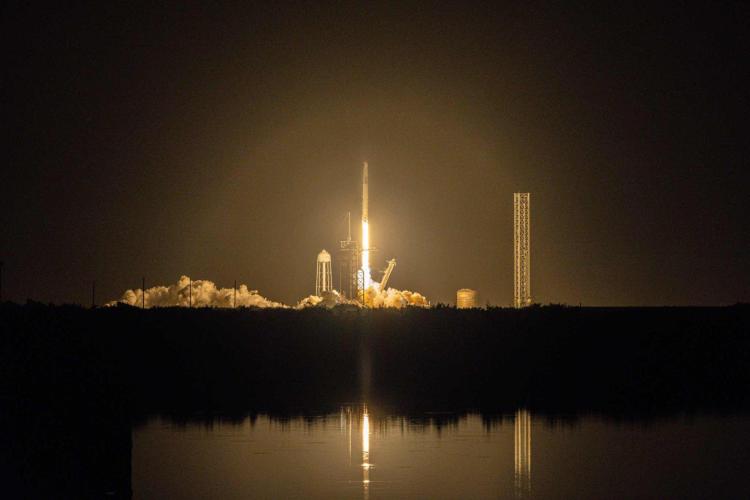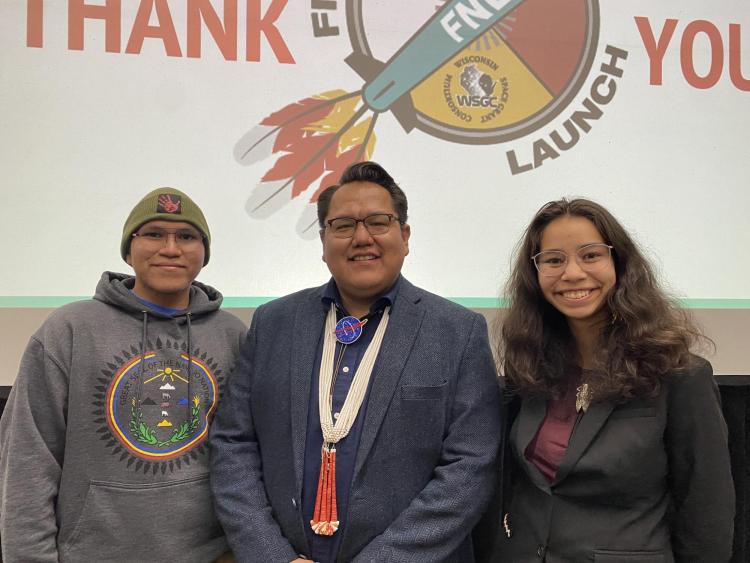CU Boulder’s AISES chapter sweeps First Nations Launch Moon Challenge 2023

“We're blazing trails and having fun,” said Evie Clarke (BioMedEngr'24), current AISES president and biomedical engineering student.
FNL offers active AISES collegiate chapters from across the U.S. and Canada the opportunity for undergraduate students to demonstrate engineering and design skills through direct fabrication in rocketry.
The competition required teams to conceive, design and create their rockets while meeting specific parameters on rocket motors and dimensions. FNL is designed for students with no prior experience working with high-powered rockets and challenges them on technical knowledge, creativity and imagination.
Nazhoné Morgan (CompSci’24) recalled the moment of truth, "we weren't sure how our rocket was going to perform," they said, but the team came through, winning first place in oral reports, written reports and the overall category for the Moon Challenge.
“I’m very proud of our team!” said Clarke. “When you have the interest and experience to do something like FNL, we know at the end of the day we’re more than capable of doing it and exceeding expectations.”
This year’s winning team drew students’ expertise from various backgrounds in aerospace engineering, computer science and exploratory studies.
Blastoff at NASA’s Kennedy Space Center

None of the members had seen a live launch up close before, so witnessing the SpaceX Crew-7 was a sight to behold. Knowing that it was an international crew going to the International Space Station made that experience even more memorable and awe inspiring.
“Before FNL, I was looking at different careers, but after working in avionics and technical aspects of rockets through computer science and aerospace, I’m now interested in pursuing something in embedded systems,” said Morgan. “This trip solidified that I'm intrigued in taking what I’ve learned from my cybersecurity class and applying that in the space field.”
What this means for AISES and the Indigenous community
Claiming victory for the First Nations Launch means so much for the CU Trailblazers.
Al Bitsoi, a second-year student in the Program in Exploratory Studies who hopes to transfer into mechanical engineering, highlighted how this experience uplifted the achievements of Indigenous students.

Through the FNL, the CU Trailblazers were able to meet NASA scientists like Aaron Yazzie. Yazzie, a mechanical engineer at the Jet Propulsion Laboratory and member of AISES, gives back to the Native community by mentoring students and serves as a judge for FNL.
“Connecting and mentoring Native students is quite important, especially those pursuing STEM,” said Yazzie. “I was exactly like them in college and wish we had competitions like FNL because it gives students access to opportunities they hope to do one day. I’m impressed by CU Boulder and FNL in general.”
Clarke noted how the FNL helps to bring aspiring Native Americans engineers, who made up 0.3% of awarded engineering bachelors degrees nationally in 2020, more broadly together.
“You see the same teams from across the country and build relationships with them and you’re rooting for each other,” said Clarke. “Celebrating the bond and success we all have brings Indigenous solidarity with each other. It’s a wonderful community to have.”
“When you’re watching the growing success of Native engineers, it warms my heart,” she said.
Greater heights ahead
This academic year brought new members for AISES which meant more new learning experiences for those students and an exciting opportunity for their organization.
“There were a lot of sophomores and juniors who didn’t know we had AISES, so it’s cool seeing their eyes light up when they know we’re here,” said Clarke.
In addition, AISES plans to partner with Native American Culture and Education through Denver Public Schools. They hope to provide workshops about rocketry and hopefully encourage students to pursue higher education while speaking about their different backgrounds.
The CU Trailblazers are gearing up already for the 2024 First Nations Launch and have entered into the more daring Mars Challenge at the recommendation of some judges. This will require them to build a rocket capable of reaching greater heights, with an added component - being able to deploy a drone and safely piloting it to a landing zone.
“It’ll really push our limits, but we have a larger team, so we’re excited to see how we all work together to bring our different majors and backgrounds,” said Clarke. “It’s just fun to try something new with all the students we have.”
After two rocket launches—one in Wisconsin and another in Florida—that brought profound experiences, the CU Trailblazers hope to prevail once again next year with new possibilities awaiting them.
Title Photo: CU Boulder AISES' team at the Kennedy Space Center. Top Photo: The CU Trailblazers from AISES with their winning rocket for First Nations Launch 2023. Middle Photo: SpaceX launch at 3 a.m. on Aug. 26, 2023. Bottom Photo: Bitsoi and Morgan with Aaron Yazzie from NASA.

